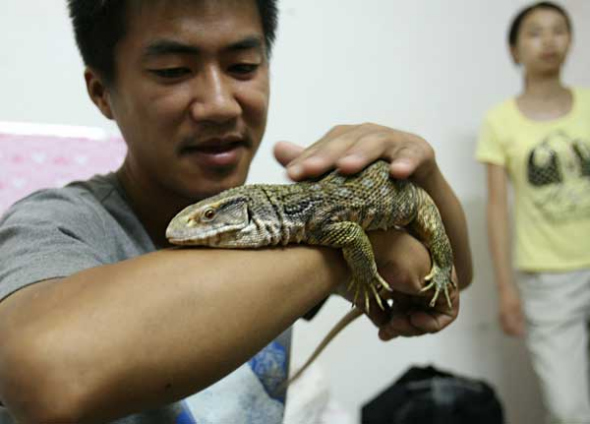

A man strokes his pet lizard in Wuhan, Hubei province. Shi Yi / For China Daily
Venomous snakes and spiders, lizards and turtles, rare cactuses — it is a list of species most people would expect to find in a zoo. Yet, increasingly, China's customs officers are finding them hidden in suitcases and mail order packages.
In the first seven months of this year, officials at exit-entry points nationwide confiscated more than 240,000 batches of wild species concealed to avoid quarantine.
They included flesh-eating piranhas from Brazil, a deathstalker scorpion from Israel — both intended as pets, authorities said — as well as African snails, which are seen as a delicacy but are already causing ecological problems in Southeast China.
With a growing number of Chinese heading abroad for vacation, coupled with the boom in online shopping, officials warn that the problem is only going to get worse if a cohesive system is not put in place.
"The extent of the problem has gone beyond the law enforcement powers of a single government agency," said Deng Minghui, deputy director of the Sichuan Provincial Entry-Exit Inspection and Quarantine Department. "We need the State to introduce specific legislation to enable close collaboration."
Preventing the spread of banned species falls under the jurisdiction of several official bodies. In this case, customs and quarantine are responsible for stopping them from entering, while those that get through are dealt with by agriculture and forestry bureaus. Plus, police forces and the post office also have roles to play.
In a written statement to China Daily, the General Administration of Quality Supervision, Inspection and Quarantine said it is trying "to further cooperation between police, customs, the post office and civil aviation authorities" and make amendments to regulations introduced in 2001 on plants and animals and mail order parcels.
However, Deng said the situation would only improve if the upgraded rules on cooperation come from the State Council.
Sold online
The easiest solution would be to dampen enthusiasm for exotic pets among the Chinese. That looks unlikely, however, especially after the Internet has made it easier to trade such animals.
Copyright ©1999-2018
Chinanews.com. All rights reserved.
Reproduction in whole or in part without permission is prohibited.